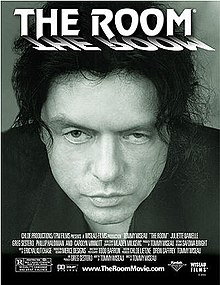Written and Directed by: Tommy Wiseau
 The Room: it’s the movie that’s so bad, it’s good. What does that even mean? As the prologue to (film of) The Disaster Artist, notes there are plenty of awful movies, and their awfulness leads to them being forgotten. As far as I’m concerned, the actual worst movie ever made probably follows an uncharismatic action star participating in various machine gun shoot-outs for two hours. So perhaps the expression, “so bad, it’s good,” is a bit misleading, in that pure quantity of badness does not equal goodness.
The Room: it’s the movie that’s so bad, it’s good. What does that even mean? As the prologue to (film of) The Disaster Artist, notes there are plenty of awful movies, and their awfulness leads to them being forgotten. As far as I’m concerned, the actual worst movie ever made probably follows an uncharismatic action star participating in various machine gun shoot-outs for two hours. So perhaps the expression, “so bad, it’s good,” is a bit misleading, in that pure quantity of badness does not equal goodness.
Of course there are bad movies that are entertaining: propaganda films of the Christian-right like God’s Not Dead, for instance. There are also films that completely blur the line between good and bad. Sausage Party, for example, piles up its crass immaturity and tastelessness in a way that actually makes for a beautiful plot arc. The Room does not fit into these categories either. The Room, rather, is an excellent movie that is simply viewed as bad because the seeming intentions of its writer/director Tommy Wiseau, do not line up with the viewing experience of its audience.
The Room is a theatrical movie. Its title is based on the idea that plays often use a single set where, to quote Wiseau, “good and bad events” alike take place. At live showings of The Room audiences will often call out one of the work’s seeming flaws, the tendency of characters to leave the door open. This, however, misses The Room’s central premise. Its central character, Johnny (Wiseau) is presented as beloved, charitable figure, much like the protagonist of Brecht’s The Good Person of Szechwan. His door is always open and characters can freely come into his house, whether it is to have sex or play football. Johnny’s charitability is particularly illustrated through the character of Denny (Phillip Haldiman), a down on his luck college freshman who buys drugs and has an inappropriate crush on Johnny’s fiancée Lisa (Juliette Danielle). Despite the fact that Denny is legally an adult and not his son, Johnny sees the good in him and is unequivocally patient with his flaws.
Another flaw in the room that audience likes to point out is the disappearance of one of its subplots. Lisa’s mother Claudette (Carolyn Minnott) at one point announces that she has breast cancer, but never mentions this again, nor acts with any urgency for the rest of the film. While the degree to which this plot hole was in fact an error is a secret that will likely remain in the head of Tommy Wiseau, this discrepancy does not in fact have an adverse impact on the movie as a whole. Lisa’s mother is a composite caricature: she is an old fashioned woman who is constantly worried about the well being of her daughter, but does not imagine her daughter can have ambitions other than marrying the right man. From that angle it makes sense that the breast cancer subplot goes away. Claudette is a “don’t worry about your poor old mother, I’m just gonna suffer, but don’t worry about me…” type. She is a perfect fit in a story where seemingly every character has a strong trait: Johnny’s sense of victimhood, Denny’s naïve lack of discretion, Lisa’s cunning frustration, Mike’s goofy sexuality, etc.
The Room can be described as a conceptual film. It can be described as a melodrama. It can also be described as an homage to movies and theatre of the past (those who seen The Disaster Artist will be pleasantly surprised to find out the inspiration for The Room’s most famous line). The Room is like few other movies, and certainly like few other dramas. It is nonetheless a coherent, captivating story that no one should avoid simply on account of its “badness.”